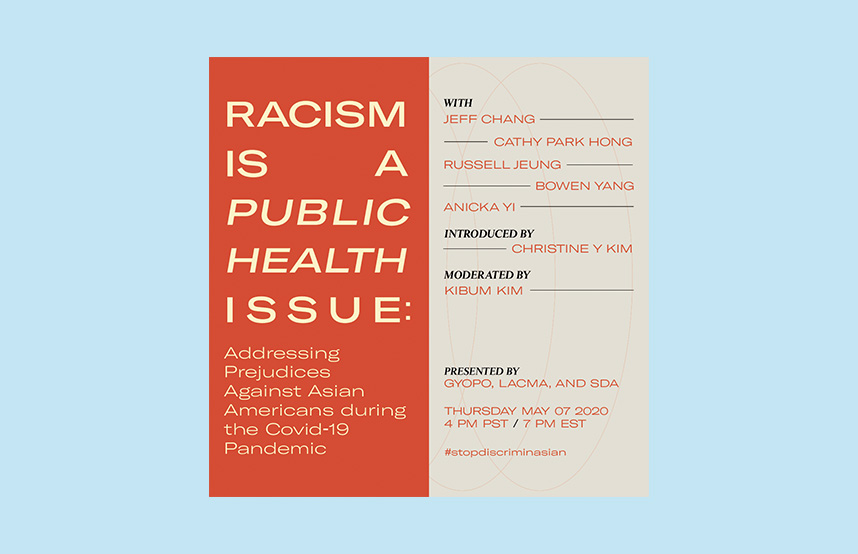Racism is a public health issue 1

Discourse
Addressing Prejudices Against Asian Americans during the COVID-19 Pandemic
May 7, 2020 | 4:30 pm
When news of a novel coronavirus arrived in the United States in early January, xenophobia was not far behind. Since the outbreak of COVID-19, reports of racist attacks against Asian Americans have increased. As the number of confirmed cases exploded in America, racial disparities in health outcomes became starker. The hardest hit are often Black and Latinx communities—many of whom are essential workers. Join GYOPO, LACMA, and StopDiscriminAsian (SDA) for the first in a series of lively virtual conversations about the economic and racial disparities that have been made blatant by this crisis.
The rise of anti-Asian and anti-Asian American racism during the COVID-19 pandemic has laid bare deep racial inequities in the United States. In the first of a series of conversations about racism and public health, GYOPO, LACMA, and SDA invite five Asian American cultural producers to speak about the racialization of COVID-19; intersections with class and gender; the history of racism against Asian Americans; and the racist myths and stereotypes that have silenced and cleaved Asian American communities.
Panelists include Vice President for Narrative, Arts, and Culture at Race Forward Jeff Chang; writer Cathy Park Hong; San Francisco State Chair of Asian American Studies Russell Jeung; actor-comedian Bowen Yang; and artist Anicka Yi. Introduced by LACMA Curator of Contemporary Art and GYOPO co-founder Christine Y. Kim, and moderated by Commonwealth & Council Partner and Associate Director of Business Development at Sotheby’s LA Kibum Kim, the panelists will speak about their personal experiences, political actions, and the need for greater discourse and a recommitment to a broader struggle for racial equity.
GYOPO urges national and local leaders and citizens across parties, industries and institutions, including arts and culture, to meditate on inclusivity and collectively transition into a new normal. This moment necessitates greater educational discourse, self-evaluation, mutual aid, and a recommitment to the broader struggle for racial equity in alliance with other marginalized groups. This first conversation aims to identify the role cultural representations play in performing, reproducing, and subverting social stereotypes.
M M M M